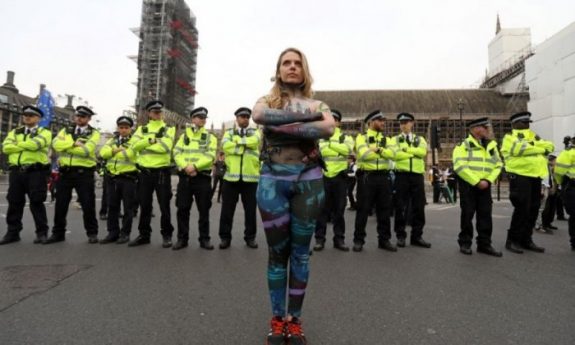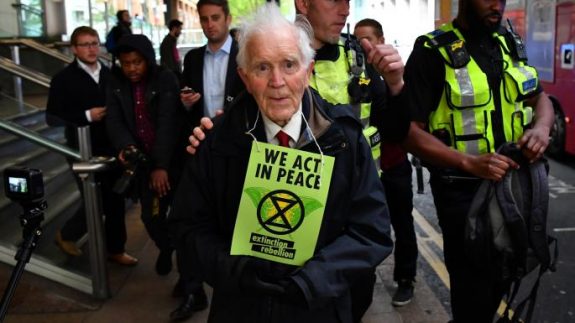Fossil Fuel’s war on protest

Madeleine King, Minister for Resources in the Albanese government recently announced that she will curtail the ability of Australians to challenge resource corporation projects in court (The West Australian 26/3/24). She has several possible motivations which just might include the prospect of a lucrative post-politics career. This attack on democratic rights is built on decades of disinformation shaping the global discussion.
King’s action comes from a long line of defenders of fossil fuel “freedoms” objecting to such court cases. George Brandis, for example, referred to people who took companies to court as “vigilante litigants” in 2015. The wording of his media release illustrated that “vigilante” is deployed to mean a danger to society one step short of terrorism: such organisations use “aggressive litigation tactics to disrupt and sabotage important projects.” There is little difference in the depiction of this decorous exercise of citizens’ democratic rights from the depiction of the peaceful but inconvenient protests of Extinction Rebellion.
Minister King, like Brandis, frames this as a matter of protecting Australian jobs, but in fact “mining is one of the smallest employers in Australia,” employing fewer than “the arts and recreation services industry.” And the Australian people earn more from HECS payments that hobble our future doctors and engineers than we do from the petroleum resource rent tax.
Climate protests, which protect not only future tourism jobs but also hope to limit the number and scale of disasters projected to cost Australia more than 1.2 trillion by 2060, are loathed by the resources sector. Characterising the protests as not just frustrating but akin to terrorism is a global project. The campaigns are designed to make anti-democratic steps such as Minister King’s intent to curtail democratic access to courts – or anti-protest legislation – seem a matter of protecting the citizenry rather than what they are: an attack on our democratic rights intended instead to protect the profits of reckless corporations.
The Atlas Network has forged the chief architecture of influence shaping public attitudes against climate action for the continued profit of fossil fuel corporations. It has long worked to make sure that anyone with objections to their work is seen as an antisocial threat rather than a defender of public treasures, whether that is a habitable climate, ancient artworks or clean water.
As well as being one of the leading Liberal Party alumni active in the Orban propaganda circle, Alexander Downer is Chairman of Trustees at one of the Atlas Network junktanks. The Policy Exchange which is based in London is, at least in part, funded by fossil fuel corporations. The Policy Exchange’s lobbying of the government appears to channel fossil fuel sector messaging unaltered. Investigations revealed that the Exchange promoted the sensational and misleading rhetoric that enabled the draconian anti-protest legislation and lengthy prison sentences given to climate protesters, who were largely defending themselves from excessive and violent policing. PM Rishi Sunak also admitted that Policy Exchange helped draft that legislation.
A former Policy Exchange senior fellow, Claire Coutinho, is now the UK’s minister for Net Zero.
Investigative journalists covering fossil fuel disinformation, Amy Westervelt and Geoff Dembicki, tracked a longterm global history of such vilification of environmental protesters.
The Australian Democracy Network’s inaugural Protest Rights Wrap illustrates the outcome of the Atlas, and direct fossil fuel lobby, pressure. In NSW the 2022 law that “skyrocketed” maximum penalties for “obstructing traffic from a $440 fine to 2 years imprisonment or a $22,000 fine.” The Supreme Court has questioned their constitutionality, but the laws are still being used and protesters trapped in restrictive bail conditions for a year. Police are deploying excessive violence against protesters.
In Queensland, counter-terrorism police raided the homes of six activists. They are at risk of one year’s imprisonment, not for spray painting an office, but for refusing to give police passcodes to access their phones.
In Victoria, a judge tripled protesters’ jail sentences, and police have asked for greater powers to move people on and to impose the necessity for police permission for protests.
Tasmania has indefinitely banned 19 people from entering native forests rather than the usual 14-day ban. One protester is jailed for 70 days before sentencing. The 2022 laws there mean “obstructing access to a workplace” could incur a 12-month prison sentence, and double that for protesting the destruction of old growth forests on site.
In South Australia, in 2023, the penalty for “obstructing a public place” was changed from $750 to $50,000 or 3-months imprisonment.
In the NT, bureaucratic measures around traffic control are being used to block protests.
Woodside in WA is using lawfare to attack protesters for “brand damage” as well as loss of earnings. It also requested a restraining order that included a ban on referring to Chief Executive Meg O’Neill by name by any electronic means.
Fossil fuel wants protest invisible and silent.
In Canada, an Atlas Network affiliate, the Frontier Centre for Public Policy, has been at the forefront of protecting fossil fuels. It has recently published a report conflating climate protest with “eco-terrorism.” The typical attacks on First Peoples’ protection of Country comes with the primary threat being identified as “anarcho-indigenism.”
Another of the ways that the Atlas Network discredits court action that interferes with resource extractor freedoms is the trope of “activist judges.” The Executive Director of New Zealand’s leading Atlas Network junktank, the New Zealand Initiative (NZI), is an alumnus of one of Australia’s leading Atlas junktanks, the Centre for Independent Studies (CIS) and was the Chief Economist at the Policy Exchange in London. Oliver Hartwich was recently published in The Australian complaining about the courts agreeing to hear a climate-based case’s appeal, describing the judges as trying to “usurp” decision making. The latest junktank to emerge in New Zealand has already used the slur of “activist judges” to discredit the decision to hear Mike Smith’s arguments.
Minister King described the challenging of gas projects as a “lawyers’ picnic” to invalidate the very urgent objections made by community groups as merely a make-work project by legal figures. Australians should be alert to such verbal tricks and refuse to succumb to this cheap appeal to their disdain for lawyers. The actual lawyers’ picnics are far more destructive and work against “civilisation” survival.
It is crucial for the electorate to resist arguments that build on our personal frustrations with traffic obstructions, or our distaste for theatrical displays of dissent. We have a handful of years to make drastic change to our energy production. Their inheritance cannot be that we abandoned our children to permacrisis without a fight.
Don’t let ruthless profiteers distract us while they strip us of democratic freedoms.
This essay was first published at Pearls and Irritations
Like what we do at The AIMN?
You’ll like it even more knowing that your donation will help us to keep up the good fight.
Chuck in a few bucks and see just how far it goes!
Your contribution to help with the running costs of this site will be gratefully accepted.
You can donate through PayPal or credit card via the button below, or donate via bank transfer: BSB: 062500; A/c no: 10495969












